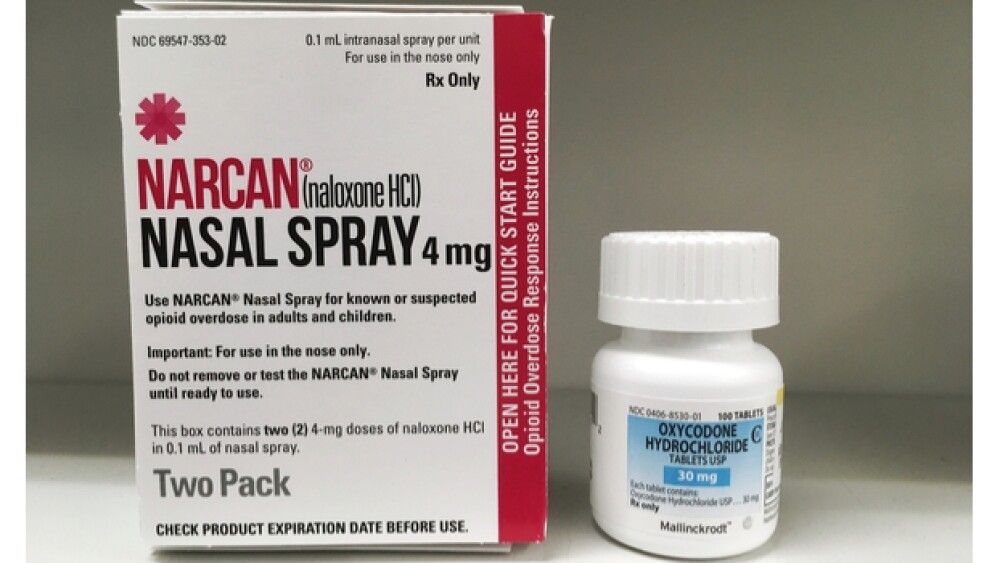As Purdue Pharmaceutical’s OxyContin has become the poster child for opioid addiction, so too has another drug become synonymous with efforts to save people who have overdosed on those drugs – Narcan, developed by California-based Opiant Pharmaceuticals.
PureRadiancePhoto / Shutterstock.com
As Purdue Pharmaceutical’s OxyContin has become the poster child for opioid addiction, so too has another drug become synonymous with efforts to save people who have overdosed on those drugs – Narcan, developed by California-based Opiant Pharmaceuticals.
Narcan is widely provided to first responders and even to families who have individuals battling opioid addiction in hopes of saving as many lives as possible. Over the past several years, BioSpace has reported on the opioid crisis running rampant across the United States. On average, 116 Americans die daily from opioid overdoses, according to the U.S. Department of Health and Human Services. A recent report that examined preventable deaths indicated that today, more people in the U.S. will die from an opioid overdose than an automobile crash. Also, a new analysis conducted by the Centers for Disease Control and Prevention indicated that drug overdose deaths among middle-aged women between the ages of 30 and 64 are soaring and have increased by 260 percent over the last 20 years. Synthetic opioids were a significant factor in that spike of death.
Many preventable deaths by opioid overdose have been prevented by Opiant’s Narcan (naloxone). In fact, last year, the U.S. Food and Drug Administration promoted the idea of prescribing Narcan to patients prescribed opioids who are deemed to be at high risk for opioid overdose.
Roger Crystal, chief executive officer of Opiant, said the issue with the opioid crisis is changing, and it might not be for the better. In an interview with BioSpace, Crystal speculated that the ongoing opioid crisis is moving into a new stage where abuse of prescription opioids and heroin is now being replaced by an increase of fentanyl. Crystal said more of the ultra-powerful painkiller is being illegally manufactured in the United States and there are rising concerns about the drug being weaponized. With that concern in mind, Opiant is working with Biomedical Advanced Research and Development Authority (BARDA), a division of HHS, to develop a potential therapy for a potential fentanyl-based attack or, for overdoses. The company is focused on developing a potent opioid antagonist that will be useful to prevent fentanyl overdoses – something that Narcan is not as able to address as well as other opioids.
Opiant is also focused on more long-term assistance for people battling opioid addiction.
“Once you’ve saved someone’s life, you have to be concerned with how you treat addiction,” Crystal said.
One program the company is pursuing is the development of an opioid antagonist implant. The implant would provide a daily treatment for opioid addicts who are struggling to quit. Crystal said patients who diligently take daily medications like suboxone or methadone do very well. However, he noted that every day and an addict has to decide to not get high and take the medication. An implantable device that would provide a daily dose of the treatment for six months “would fit the bill,” he said.
As a former London-based surgeon, Crystal could see warning signs for an impending opioid crisis. He recalled a visit to the U.S. in the early 200s to spend time with his brother and family, who live in New York. His sister-in-law was dealing with a minor pain issue but had been prescribed more than a month’s worth of an opioid pain killer, he said. Seeing the large bottle of pills for what was described as minor pain was concerning, he said. For him, that was the beginning that led to his leading the company that developed Narcan.
While he has no data for the number of lives that have been saved due to the administration of Narcan, Crystal said he was “humbled and privileged to be part of a company that developed a medication that has saved countless lives.”
Opiant isn’t just focused on opioids though. The company is taking on addiction in many forms. Most recently, the company acquired drinabant, a cannabinoid CB-1 receptor antagonist that will be used in an emergency setting for acute cannabinoid overdose (ACO). The type of overdose that drinabant is being developed for comes from the ingestion of so-called “edibles” that contain large quantities of D9-tetrahydrocannabinol (THC) and synthetic cannabinoids, such as those that are sold with the label K2 or Spice.
While not as life-threatening as opioid overdose, Crystal said cannabinoid overdoses are likely to increase, particularly as more states legalize marijuana. In Colorado, where marijuana has been legalized, Crystal said there was a 20 percent increase in ER visits due to cannabinoid overdoses. In 2016 there were about 1 million ER visits related to cannabinoids in the U.S., he said.
“It’s not quite like the opioid crisis, but there are some similarities,” he said. “Our expectation is that the need for this will only increase.”





